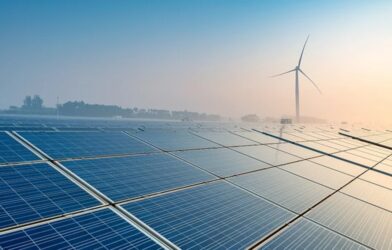In its FY 2024–25 sustainability report, JSW Steel Ltd. announced that it has commissioned India’s largest green hydrogen facility for steelmaking and reduced its carbon intensity by 30 per cent from 2005 levels, marking its most significant progress to date towards a net-zero emissions target by 2050. The Vijayanagar Steelworks’ 3,800-tonne-per-year hydrogen plant, which is fuelled by 25 megawatts of renewable energy, will be essential to the company’s shift to low-carbon steel production. Additionally, JSW obtained “Responsible Steel” certification for four significant locations, which account for more than 80% of its steel production: Vijayanagar, Dolvi, Salem, and Tarapur. India’s first accredited downstream steel factory was Tarapur.
According to the report, the company was ranked in the top two global steelmakers in the S&P Global Corporate Sustainability Assessment and maintained its World Steel Association “Sustainability Champion” status for a seventh year in a row. Additionally, it continued to be included in the Dow Jones Sustainability Emerging Markets Index and the Dow Jones Sustainability World Index. In the company’s report, Chairman Sajjan Jindal stated, “Our roadmap is clear: decarbonise steelmaking at scale while continuing to grow responsibly.” “The three main pillars of that journey are renewable energy, carbon capture, and green hydrogen.”
By FY 2029–2030, JSW Steel wants to lower its carbon dioxide emissions intensity from 2.37 tCO₂ per tonne of crude steel to 1.95 tCO₂ per tonne of crude steel. To lessen its dependency on primary ore, the company is boosting waste heat recovery, increasing scrap usage, and testing carbon capture technology in addition to encouraging the use of green hydrogen. JSW’s strategy to attain carbon neutrality in its directly operated operations by 2050 is detailed in a specific roadmap under its Sustainable Energy, Environment and Decarbonisation, or SEED, initiative. The company is considering a specialised green steel facility in western India with plans to switch from natural gas to green hydrogen in order to meet the growing demand for low-carbon steel amid stricter global climate rules, such as the EU’s Carbon Border Adjustment Mechanism.
The company recorded its best-ever operating performance, but ESG advances were the year’s biggest driver. Sales of crude steel reached 26.45 million tonnes, while production increased to 27.79 million tonnes. A strategic shift to higher-margin, lower-emission steel segments is reflected in the fact that value-added and special goods accounted for 62% of total sales. With 91 per cent capacity utilisation throughout operations and a net profit of ₹3,491 crore, the combined revenue came to ₹1.69 trillion ($20 billion). India’s steel consumption increased by 11.5 per cent annually, its fourth consecutive year of double-digit growth. Over the next three years, JSW intends to invest ₹61,863 crore in raw material security, decarbonisation, and capacity growth. With cash and equivalents of ₹19,394 crore and a net debt-to-equity ratio of 0.94x, its financial condition remained stable.
JSW Steel’s environmental initiatives went beyond the energy shift to include the use of circular resources and water conservation. According to the study, the corporation maintained zero liquid discharge across all key plants and recycled approximately 22 million cubic metres of wastewater over the year. Its watershed development initiatives support the “Jal Jeevan Mission” of the Indian government, which aims to provide sustainable rural water access. In terms of biodiversity, JSW planted 125,000 seedlings and carried out conservation and habitat restoration plans at every location. In the meantime, the steelmaker achieved a 99.98 per cent waste recycling rate, which supports its circular economy concept, by recycling 9.12 million tonnes of materials. Although carbon emissions garnered the most attention, JSW also decreased other pollutants.
The intensity of air emissions was 0.36 kg/tonne for particulate matter, 1.51 kg/tonne for sulphur oxides, and 1.09 kg/tonne for nitrogen oxides. These are important but little-known numbers for local air quality. In terms of mining, the company runs three coking coal mines and 23 captive iron ore mines, which together account for 0.38 billion tonnes of coal reserves and 1.6 billion tonnes of iron ore reserves. Notably, JSW is experimenting with technology to process low-grade banded haematite quartzite, decreasing ecological disturbance and generating value from previously useless rock. JSW kept bolstering its policies on inclusion, equity, and diversity. Under its Graduate Engineer Trainee programme, women accounted for over 20% of new engineering employment. Although its all-female production lines in Vijayanagar and Vasind garnered notice, efforts to promote workplace diversity are still a priority. Additionally, workplace safety grew in popularity.
Employees and contractors received almost 770,000 hours of safety training. Artificial intelligence-enabled chatbots, immersive training facilities, and digital platforms were used to improve real-time risk mitigation and establish a safety-first culture. JSW Steel described its human rights strategy, which includes community involvement and due diligence, especially in the indigenous areas that surround its mining activities. The business stated continuous consultation and alignment with international values, even if it hasn’t been benchmarked against global frameworks yet. Sustainability in the supply chain also advanced. The company maintained an 88 per cent customer complaint resolution rate and acquired about 5.6% of its material inputs from MSME vendors. According to JSW, it is attempting to strengthen its vendor ecosystem’s traceability and resilience.
ESG is included in executive and board decision-making at the governance level. Internal controls, ethics standards, and whistleblower protections have all been strengthened; however, not many specifics have been made public. The corporation did not specifically report on cybersecurity, data governance, or AI ethics, despite the fact that digitisation activities were emphasised for operational improvements. These areas are becoming more and more important as industrial processes become more automated and data-driven. In FY 2024–2025, JSW’s CSR initiatives addressed an estimated 3 million individuals, with ₹363 crore going towards women’s entrepreneurship, skill development, healthcare, education, and water access.
With a 76 per cent placement rate among existing participants, its flagship programme, the Skill Impact Bond, aims to reach 50,000 adolescents. Project Sakhi and JSW Shakti are two initiatives that promote women’s employment in the artisanal and IT industries. JSW is still optimistic about India’s industrial expansion in spite of obstacles, such as a pending Supreme Court decision over its acquisition of Bhushan Power & Steel. “We’re moving boldly ahead—with scale, sustainability, and speed—despite these headwinds,” Jindal stated.















Comments are closed